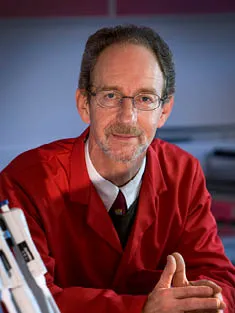Winner: 2020 Anne Bennett Memorial Award for Distinguished Service
Dr Mike Foulkes
University of Plymouth
For long-standing service to the RSC Analytical Division and the sustained promotion of analytical chemistry, particularly atomic spectroscopy.

As a Lecturer in Chemistry for over 30 years, Dr Mike Foulkes’ job was to show where chemistry fitted into the real and practical ‘everyday’ world to help students not only understand certain areas of chemistry but also to train them in how they could roll their sleeves up and actually practice chemistry. One major area in his teaching was Analytical Chemistry, where one can identify and measure the elements and their compounds that are all around us and form part of our everyday lives. In this world where food, water, power, health and the environment are so important to us and this planet’s future, we need to know what is there, how much is there and how it interacts with everything around us. We can help to both protect and provide, if we have that knowledge.
Biography
Dr Mike Foulkes left school with one A-level, in Chemistry, so he could work as a technician in industry. He undertook day release and evening classes at Harrow Tech. for four years in order to gain his ONC and HNC in Chemistry. He moved jobs during this time, working in analytical chemistry. While with the Cookson Group, he completed his parts I and II GRIC to graduate as a chemist, ending up as a laboratory manager. After some 13 years in industry, Dr Foulkes joined Les Ebdon’s PhD group at Plymouth (now University) in 1985 to study the analytical properties of the newly-available IC plasma. Upon completion of a post-doctoral position with UoP and MAFF, he gained a lectureship in Environmental Chemistry within Environmental Sciences at Plymouth. This academic career progressed through Senior lecturer to the position of Associate Professor in Environmental and Analytical Chemistry which he held until he retired at the end of 2018.
Dr Foulkes’ academic day-job was based upon teaching, training and research. Teaching focused on inorganic and analytical chemistry, from access through to post-graduate programmes in both chemistry and environmental science courses. Many modules, courses and field-work he ran or contributed to were practically-based with hands-on teaching; including chemistry in the rainforest. His research has focused on analytical techniques, often using atomic spectroscopy. Dr Foulkes is the author or co-author of over 50 peer-reviewed papers, chapters and books (the latest with Hywel Evans; ‘Analytical Chemistry: A Practical Approach’). He has presented at many national and international conferences and has supervised numerous PhD students. He has also been a chemistry admissions tutor and ISO quality measurement manager.
I was lucky to have a chemistry teacher who inspired me and believed in me.
Dr Mike Foulkes
Q&A
How did you first become interested in chemistry?
I was always interested in the sciences but at secondary school while in my early teens, chemistry just ‘clicked’ with me. I really enjoyed it.
Who or what has inspired you?
I was lucky to have a chemistry teacher who inspired me and believed in me.
What motivates you?
A need to know how something actually ‘works’, on a chemistry level, and a passion for the subject.
What has been your biggest challenge?
Two major challenges in my chemistry career have included: 1) undertaking GRIC parts I and II part-time and on day release, and 2) leaving industry after around 13 years to undertake a PhD, which led to an entirely different but highly rewarding academic career.
What has been a highlight for you?
The chance to teach chemistry and to train students and hopefully inspire a generation of future chemists - very rewarding.
What is something you are looking forward to?
The opportunity to continue presenting chemistry in whatever form it may take, as I’m now retired from full-time lecturing.
What advice would you give to a young person considering a career in chemistry?
It doesn’t matter who you are, if you have a passion for your subject and really enjoy what you do, then with perseverance and with the range of skills you acquire along the way, you will succeed.
What is an exciting scientific development on the horizon?
Difficult to single out one. Just look in Chemistry World, there’s so many. But two come to mind, one being pollutant capture techniques, the other photosynthesis mimics.
Why do you think teamwork is important in science?
Individual contributions are always important, but the scientific world works through interactive communication, by collaboration and these days often by brainstorming. The big challenges in science will need solutions from teams.
Why do you think international collaboration is important in science?
Because the big questions and challenges are global. For example, pollution has no geographical boundaries.
Why do you think interdisciplinary research and collaboration is important in science?
Somebody once provocatively said that the individual science disciplines are a “late-Victorian educational construct”. A fatuous statement perhaps but the point is well made when you ask a simple question like “if Environmental Science is a study of the bio-geo-chemical interactions within a socio-economic and political framework, then where does one discipline finish and another begin?”
What is your favourite element?
Actually, I don’t have a favourite element but because I taught the periodic and analytical table, I do have a favourite Group; that is Group 14 (the old Group IV), C, Si, Ge, Sn and Pb. The change in character from top to bottom is like a ‘spectrum’ effect, and understanding it is a delight - if you know the rules.